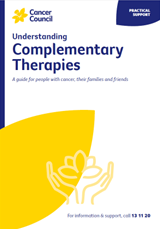- Home
- Cancer Information
- Living well
- Complementary therapies
- Making informed decisions
- Finding a complementary therapist
Finding a complementary therapist
Talking with your GP or cancer care team is a good starting point. Your cancer treatment centre may offer some complementary therapies or be able to recommend suitable therapists in your local area. Natural therapy associations often provide directories of therapists. Your family or friends or support group may also be able to recommend a therapist. Some doctors, nurses and pharmacists are also qualified in a complementary therapy, such as nutritional and herbal medicine, hypnotherapy, counselling, acupuncture or massage.
What to consider when choosing a therapist
- Always check the therapist’s qualifications and whether they are a member of a professional association.
- Ask if they have experience treating people with your type of cancer.
- Ask about the cost for each session and how many sessions you are likely to need.
- Ask if they have insurance.
- Confirm that the therapist is willing to communicate with your cancer care team about your conventional treatment, especially if you are using remedies that may interfere with this treatment.
- Check whether the therapist would like to see a list of the medicines you are taking or your conventional treatment plan. This reduces the risk of them dispensing remedies or other treatments that might interact with your conventional treatment.
- Keep a record of the treatments given and medicines or supplements you have been prescribed.
- Take someone with you to appointments to offer support, get involved in the discussion, take notes or simply listen.
How to assess online information
There are 4 key ways to ensure the information you are looking at online is trustworthy:
- The source – Is it reputable? Have you seen it before? Is it clear who is providing the information? Check the “About us” section.
- The reviewers – Has the information been reviewed by experts with qualifications specifically related to cancer?
- The date – When was the information last reviewed? Ideally, it should be within the last 2–3 years.
- The claims – Is the website promoting a “miracle cure” or selling something? If it sounds too good to be true, it probably is.
Check with your doctor before trying any new therapy.
→ READ MORE: Can I help myself or should I see a professional?
Meditation and Relaxation Podcast
Listen to more of our meditation and relaxation podcast for people affected by cancer
More resources
Dr David Joske, Clinical Haematologist, Sir Charles Gairdner Hospital and PathWest, Chairman and Founder Solaris Cancer Care Foundation, Clinical Professor of Medicine, The University of Western Australia, WA; Australasian Integrative Medicine Association (AIMA); Dr Robert Blum, Clinical Director, Cancer Services, Bendigo Health, NSW; Sally Brooks, Senior Pharmacist, Medicines Information, Peter MacCallum Cancer Centre, VIC; Dr Suzanne Grant, Senior Research Fellow, NICM Health Research Institute, Western Sydney University, and Chris O’Brien Lifehouse, NSW; Prof Danforn Lim, Adjunct Professor and Advisory Board Member, NICM Health Research Institute, Western Sydney University, and Adjunct Professor, UTS, NSW; Christina Line, Statewide Services Senior Coordinator, Cancer Council WA; Jen McKenzie, Physiotherapist (Lymphoedema) and ESSA Accredited Exercise Physiologist, The McKenzie Clinic, QLD; Simone Noelker, Wellness Centre and Pastoral Care Manager, Ballarat Regional Integrated Cancer Centre, VIC; Dr Nirzari Pandit, General Practitioner, RACGP Specific Interests Integrative Medicine Group, NSW; Georgie Pearson, Consumer; Cris Pirone, Counsellor, Cancer Council SA; Dr Elysia Thornton-Benko, Specialist General Practitioner, and UNSW Research Fellow, NSW; Kirsty Trebilcock, 13 11 20 Consultant, Cancer Council SA.
View the Cancer Council NSW editorial policy.
View all publications or call 13 11 20 for free printed copies.
Need to talk?
Support services
Coping with cancer?
Speak to a health professional or to someone who has been there, or find a support group or forum
Looking for transport, accommodation or home help?
Practical advice and support during and after treatment
Cancer information
Dealing with the diagnosis
Common reactions to a cancer diagnosis and how to find hope
Explore our resource hub
Explore and download our booklets, fact sheets, podcasts, webinars and videos for people affected by cancer

